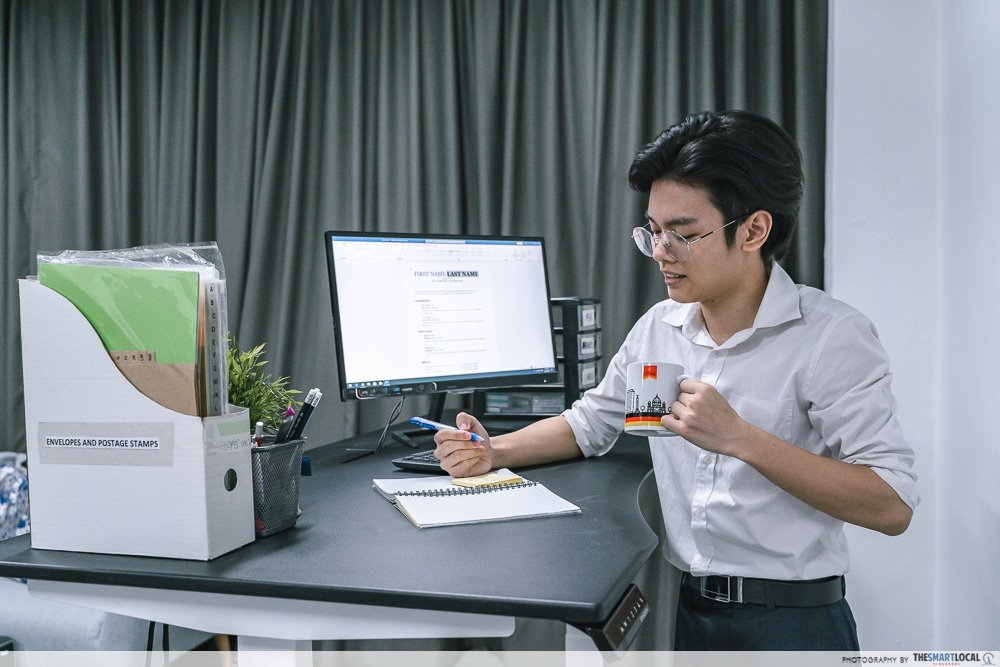Business Japanese lingo
Japanese language proficiency is one thing when working in a Japanese company. Mastery of business lingo is another.
Uninformed newcomers to the Japanese working culture often use phrases that are considered taboo when speaking to their superior by mistake. And doing so earns them at least an hour-long lecture from their boss coupled with public humiliation. Nobody wants a bad first day of work, we know.
So, to help you secure a more smooth-sailing work life, we’ve gathered 10 commonly misused Japanese phrases to avoid saying to a higher-up in your workplace.
1. Is it okay? (ii desu ka?)

Image credit: The Smart Local
In Japanese: いいですか?
How to pronounce: E-e-des–kah?
Sometimes, you might be tasked to do a powerpoint presentation, where there is a fixed layout to follow. To check with your Japanese boss whether you have the correct layout, you would then ask, “Is this okay?” or something to that effect.
While “ii desu ka” is commonly used in everyday life, it is considered too casual in a workplace setting. So instead, say “yoroshii desu ka?” (よろしいですか; is it okay?), which is considered more polite.
2. Are you free? (jikan arimasu ka?)

Image credit: The Smart Local
In Japanese: 時間ありますか?
How to pronounce: Jee-kan-ah-ri-mas-kah?
Trying to get a hold of your colleague or worse, boss’s schedule can be hard. Hence, if you need to discuss something with your superior, it’s common practice to approach them and ask if they’re occupied at the moment.
Asking “Are you free?” usually does the trick in most countries, since it shows your courtesy in trying to accommodate the other person’s schedule. However, from the perspective of a Japanese boss, it may come across as an insult.

Image credit: Bich Tran
In their opinion, by directly asking if they’re free, you’re implying that you only approached them because they appear to be doing nothing – to put it bluntly, slacking off. By extension, you’re suggesting that you’re giving them something to do since they have so much time on their hands.
To get the same message across without leaving a sour taste in your boss’s mouth, use “ima, ojikan yoroshii deshō ka?” (今、お時間よろしいでしょうか; could you spare me some of your time?) instead.
3. Of course (mochiron)

Image credit: The Smart Local
In Japanese: もちろん。
How to pronounce: Mochi-ron.
Another phrase that’s well-intentioned yet not well-received by Japanese bosses is “of course”.
When a boss asks whether you’ve prepared the materials for a meeting, for example, it’s common to think that they expect a positive response. Answering “of course” then seems nothing more than an innocent affirmation – at first glance, that is.

Image credit: The Smart Local
To a Japanese boss, getting “of course” as a reply is equivalent to a slap in the face. That’s because it has the negative connotation of “Why did you ask such an obvious question?”
So to avoid angering your Japanese boss, answering a simple “hai” (はい; yes) will work.
4. You’ve worked hard (gokurō sama desu)

Image credit: The Smart Local
In Japanese: ご苦労様です。
How to pronounce: Go-cool-ro-o-sah–mah-des.
Superior-subordinate relationships aside, bosses are humans too, and they may offhandedly comment on how tired they are from things like, say, a heavy workload. You may be tempted to offer support verbally in such instances, but choose your words carefully.
2 Japanese phrases commonly used to reaffirm someone’s hard work are “gokurō sama desu” (ご苦労様です) and “otsukaresama desu” (お疲れ様です).

Image credit: The Smart Local
Since usage of the former is rarer, some are inclined to think it’s fancier and hence use it to impress their Japanese superiors. However, the chances of the act backfiring on you are higher.
While both phrases have similar meanings, “gokurō sama desu” has traditionally been used by bosses to their subordinates. So, saying it would imply an authoritative tone.
To avoid displeasing your Japanese boss, opt for the safer option of “otsukaresama desu”.
5. I see (naruhodo)

Image credit: The Smart Local
In Japanese: なるほど。
How to pronounce: Nah-ru-ho-do.
When listening to your boss explaining something new, using interjections to show interest is the politically correct behaviour. Uttering “I see” in this case seems fair, but – you know the drill – Japanese bosses don’t take kindly to this phrase.
To them, saying “I see” insinuates that you’re treating their words as mere opinions that can be freely accepted or dismissed. That certainly wouldn’t reflect well on you, who’ll probably end up confused by your boss’s side-eye.
Stick to the multi-purpose response “hai” (はい; yes), and you’ll be fine.
6. Understood (ryōkai)

Image credit: The Smart Local
In Japanese: 了解。
How to pronounce: Ri-yo-o-kah-e.
In the same vein as “I see”, “understood” is considered a taboo phrase to your Japanese superior; it conveys the idea that you decided to accept a task assigned to you – the keyword being “decided”.
If you just want to acknowledge a new deliverable, say “kashikomarimashita” (かしこまりました; certainly) instead.
7. I don’t understand (wakarimasen)

Image credit: The Smart Local
In Japanese: わかりません。
How to pronounce: Wah-ka-ri-mah-sen.
There will inevitably be times when you don’t fully understand what your Japanese boss has tasked you to do.
When that happens, and your boss follows up with, “Do you understand what I said?”, it’s only natural that you might reply “I don’t understand”.
Once again, this simple reply might anger your Japanese bosses because they may think that you didn’t have any intention of trying to understand their directive the first time they conveyed it.

Image credit: The Smart Local
To them, saying “I don’t understand” sounds like you weren’t paying attention at all, which is why you can’t even ask specific questions about the part(s) you don’t understand.
So instead of using that general phrase, try identifying the section you’re confused about and ask for clarification by saying, “mōshiwake gozaimasen ga, X bubun wo mō ichido setsumei shite itadakemasu ka?” (申し訳ございませんが、X 部分をもう一度説明していただけますか; sorry, but could you repeat part X again?).
8. More or less (ichiō)

Image credit: The Smart Local
In Japanese: 一応。
How to pronounce: Itchy-o-o.
After you’ve been given a task, superiors will typically follow up by asking, “Have you finished what I asked you to do?”
Getting jittery and wanting to do a final check before submission, some newcomers dish out the vague answer “more or less” to their Japanese bosses. However, an answer like this shows uncertainty in your own work and suggests that you’re incapable. In the long run, your Japanese boss may not trust you enough to delegate important tasks.
For such situations, replying with a straightforward “hai” (はい; yes) or “iie” (いいえ; no) is recommended. If you answer using the latter, elaborate on which stage of the work you’re at.
9. Good luck (Ganbatte)

Image credit: Felicity Tai
In Japanese: がんばって。
How to pronounce: Gan-bah-teh.
As unfazed as they may seem, your superior can get nervous over a big event they’re in charge of – for instance, meeting with and interviewing a VVIP guest. If they tell you about it, don’t fall into the trap of blurting out “ganbatte” like the caring colleague you are.
“Ganbatte” is a very casual phrase that’s used with family and friends. So, saying it to your Japanese boss may make them feel like you’re treating them as a kid or an equal – or worse, making light of their struggle.
Simply empathise and say “sōnan desuka” (そうなんですか; is that so).
10. Goodbye (sayōnara)

Image credit: Gustavo Fring
In Japanese: さようなら。
How to pronounce: Sa-yo-o-nah-ra.
Last but not least, “sayonara”.
Some newcomers to the Japanese business culture commit the mistake of uttering “sayonara” every time someone leaves the office – for instance, when they’re seeing their bosses, who’re heading out for an external meeting, off.
“Sayonara” is typically used for permanent farewells, or if you don’t know when you’re ever going to meet the person again. Hence, by saying it to your Japanese boss… you’ll likely be sayonara-ed out of your job instead.

Image credit: The Smart Local
To send your Japanese superior off, say “itterashaimase” (いってらしゃいませ; see you/take care). If you’re the one leaving for off-site work, switch to “ittekimasu” (行ってきます; I’ll be off).
Business Japanese lingo to know
Don’t worry about suffering alone from the mental gymnastics involved in conversing with your Japanese superior. Even native Japanese themselves make slip-ups in choosing the right words during the early stages of their work life – it is what it is.
With this cheat sheet of 10 Japanese phrases to avoid when speaking to your boss, you’ll be better prepared for the Japanese workplace, where superior-subordinate hierarchy is highly upheld.
Also check out:
- 13 Japanese phrases for shopaholics
- Tips and tricks for self-learning Japanese
- 10 essential Japanese phrases to know
- 15 Japanese phrases for foodies
- 9 basic Japanese language tips
Cover image adapted from: The Smart Local and Felicity Tai
